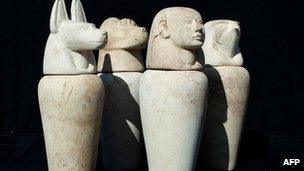Ancient tombs unearthed in Egyptian city of Luxor
- Published

Jars were used to contain the liver, lungs, stomach and intestines of the deceased
Italian archaeologists have unearthed tombs in the southern Egyptian city of Luxor that are more than 3,000 years old.
Egypt's antiquities ministry says the tombs were found under the mortuary temple of the Pharaoh Amenhotep II, who reigned from 1427 BC to 1401 BC.
The temple is located on the western bank of the River Nile.
The ministry said remains of wooden sarcophagi and human bones were found inside the tombs.
Jars used to preserve the liver, lungs, stomach and intestines of the deceased were also found, decorated with images of the four sons of the god Horus.
The figures - which have the heads of a human, a baboon, a jackal and a falcon - were believed to help the soul find its way to heaven.
Wafaa Elsaddik, a professor of Egyptology, told the BBC the find was significant because it showed that temples were not just used for worship, but for burial as well.
She said the jars were of very good quality which suggested that the tombs had belonged to wealthy people.
- Published16 January 2012
- Published31 May 2010